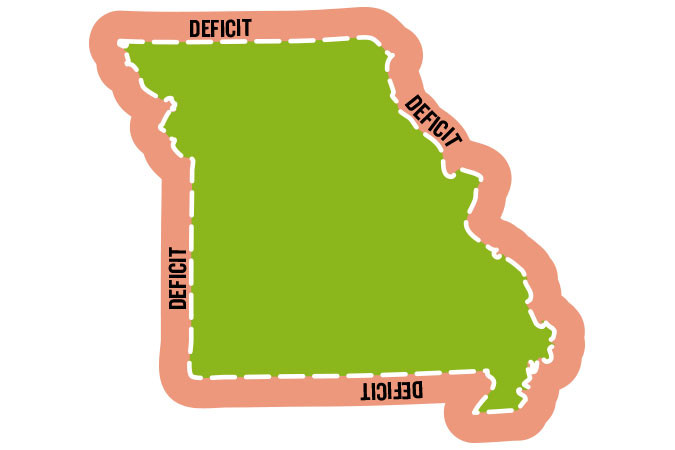YOUR BUSINESS AUTHORITY
Springfield, MO
YOUR BUSINESS AUTHORITY
Springfield, MO

Last edited 8:57 a.m., Aug. 11, 2015
The United States is no stranger to deficit spending. It’s a hotly debated topic in areas such as military defense and health care. But what about when it comes to the nation’s natural resources?
America hit a bleak milestone July 14: The 50 states are officially in an ecological deficit.
The U.S. has exhausted all the natural resources that can be replenished in a calendar year, according to a new report from a pair of nonprofit environmental groups. All use from now until Dec. 31 is deficit environmental spending.
“Think about it like a bank account. It’s a bit early in the year to be using up all your money,” said Mathis Wackernagel, president of Global Footprint Network, which released the study in conjunction with Earth Economics. “The day you spend $1 over, you don’t feel it much. But when you look at your account statement at the end of the year, it’s not going to be pretty.”
The U.S. is one of the richest nations in the world in terms of natural capital, but it’s also one of the most gluttonous. According to the study, U.S. citizens demand twice the renewable natural resources and services available within the nation’s borders.
Known as an ecological footprint, the measure is calculated as the sum of all land areas needed for food; fiber and timber for such products as clothing and furniture; infrastructure, such as housing and roads; and absorption of carbon emissions from burning fossil fuels. The ecological footprint then is compared to the productive area available within each state to provide for these services. The equation determines biocapacity.
The Show-Me State has a biocapacity of 16 global acres, but an ecological footprint of 19.5 global acres annually, giving Missouri an ecological deficit of 3.5 global acres. In comparison to states such as California – now in its fourth straight year of widespread drought and posting an ecological deficit of 14.6 global acres – Missouri is rich in biocapacity.
“Missouri is an upper middle-class family,” Wackernagel said, “but you still have to live within your means.”
Locally, Springfield Sustainability Officer Barbara Lucks said the Queen City takes steps each day to live within its means, but it’s going to take an effort statewide.
“Missouri is unique in that we are almost like three small states,” she said.
“St. Louis, Kansas City and Springfield all have different cultures and environments, and sometimes coordinating those is difficult.”
In 2014, Gov. Jay Nixon signed an executive order charging the Missouri Department of Economic Development Division of Energy with developing the state’s first comprehensive energy plan. The deadline has since been extended to Oct. 15.
“I think not having a statewide energy policy hurts us, but in Springfield I believe we are only deficit in policy and paperwork, not in actions,” Lucks said.
The solutions
How do we keep the earth’s ecological bank account from hitting zero? Wackernagel believes Americans need to concentrate on four key areas: planned urbanization, power consumption, population size and food consumption.
According to the study, because America’s economic system developed during a time when resources were abundant, decisions were made without considering the explicit contribution of nature to economic activity.
Global Footprint Network, the international think tank working to drive sustainable environment policy decisions, believes it’s possible to balance the ecological bank account, but it will take solid bookkeeping.
“Americans can do anything. It’s amazing really,” the Swiss Wackernagel said. “Look at factories during World War II. You shifted from making cars to planes in one day.
“But there must be some understanding that this is not an ideological debate, that climate change isn’t a hoax. This is a real life problem.”
Wackernagel points to Mediterranean cities that developed before automobiles as an example.
“People are forced to walk or bike more in those cites, which therefore have less fossil fuel emissions than, say, a sprawling city like Atlanta,” he said. “Proper planned urbanization can help.”
Local lessons
Big picture, Lucks said Springfield is on the forefront of ecological strategy as it works to develop a comprehensive policy for Environmental Protection Agency and Missouri Department of Natural Resources regulations.
“We are one of two communities in the country working on this,” she said. “There is so much overlap with regulations on drinking water, wastewater, air, etc. We are working though that overlap and looking for conflicts and gaps.
“When you wrap a ribbon around the whole project, it could be upwards of $1 billion as we become more efficient.”
Regionally, Springfield and the city of Nixa have taken steps in the past year to utilize more solar power. Opening in August 2014, the 40-acre CU solar farm is used during peak-use hours in the afternoon to offset dependence on coal-generated power. CU also uses natural gas and wind in its power portfolio. Energy from burning coal is still significantly less expensive than from other sources, according to Steve Stodden, CU associate general manager of electric supply, but it also poses the greatest threat to the environment. According to Springfield Business Journal archives, 8-11 percent of Springfield’s energy is delivered from renewable sources.
While the overall picture is key, Lucks said the little things can have the most profound effect. For example, the Noble Hill Energy Center harnesses methane gas produced by the landfill and contributes 3 megawatt-hours of energy to the grid, enough to run hundreds of homes. Lucks also points to small things, such as LED bulbs in traffic lights and the use of diverging diamond interchanges to reduce idling traffic.
Wackernagel said as cities begin to operate within their means, it would create an ecological surplus and ripple across the state.
“I believe the city needs to be a role model for these actions,” Lucks added. “We have to walk the talk.”
Alair Springfield is first Missouri franchise for Canada-based company.